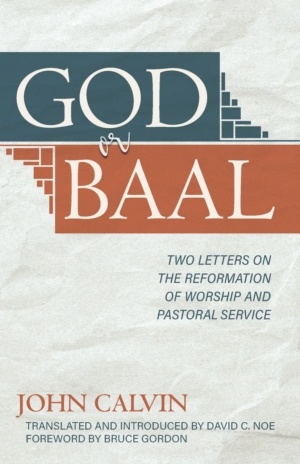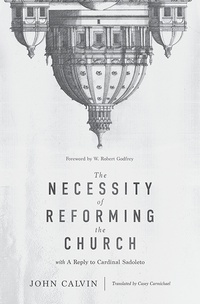John Calvinsists on the importance of adhering to the exclusive particle. Continue reading →
Calvin Studies
Calvin Against The Chiliasts
But Satan has not only befuddled men’s senses to make them bury with the corpses the memory of resurrection; he has also attempted to corrupt this part of the doctrine with various falsifications that he might at length destroy it. I pass . . . Continue reading →
Calvin On Romans 7: Paul Writes About The Believer’s Struggle With Sin
Paul begins now to make a closer comparison between the law and the nature of man, in order that the origin of the wickedness which leads to death may be more clearly understood. He then sets before us the example of a . . . Continue reading →
Jerome Bolsec (2): Calvin’s Appeal For Help
To encourage that united front and confound Bolsec’s claim for support, the magistrates of Geneva sent a letter to the ministers of Switzerland, late in October, 1551, telling them of Bolsec’s actions and teaching: “He made an attempt, eight months ago, in . . . Continue reading →
Jerome Bolsec (1): The Primary Source Of Most Of Calvin’s Bad Press
The facts of the controversy are rather simple. Jerome Bolsec who was a Carmelite monk and doctor of theology in Paris, was drawn to the Reformation and so forced to leave France. By early 1551 he had settled in the canton of . . . Continue reading →
The Reformation Was Not As Radical As You Think: Calvin And Virtue Ethics
There is a widely held perception today—shared by ethicists, historians of ethics, and theologians—that the Reformation inaugurated a sharp break from earlier forms of eudaimonist virtue ethics prevalent in the medieval period (Rehnman 2012, 473–75, 490; Herms 1982). The assumption that the . . . Continue reading →
A Reformation Doctrine To Be Recovered: Every Christian Has A Vocation
Finally, this point is to be noted: the Lord bids each one of us in all life’s actions to look to his calling [vocatio].8 For he knows with what great restlessness human nature flames, with what fickleness it is borne hither and . . . Continue reading →
Calvin As Theologian Of Comfort
Wikipedia, that ubiquitous source of unimpeachable scholarship, defines “consolation” as “something of value, when one fails to get something of higher value….” That is precisely the opposite of what John Calvin (1509–64) meant by “consolation.”For Calvin, the consolation that Christ gives to his people, by the gospel, through the Spirit, is not second prize but to be valued above that which we lost. When we consider Calvin, “consolation” might not be the thing we first associate with him. The dominant perception of Calvin our culture is that of a tyrannical, dyspeptic fellow, who delighted in nothing more than to dispatch a few heretics to the flames before breakfast. That caricature, however, was one drawn by his enemies during his lifetime and sadly, despite the facts, it has stuck for a variety of reasons. Continue reading →
There Is No Evidence That Calvin Bowled On The Christian Sabbath
A remarkably durable anecdote about John Calvin, the great Protestant Reformer of Geneva, is often related by those critical of the Puritan view of the Sabbath…The goal seems to be to demonstrate that the Reformers were not tainted with that ‘pharisaical’ of . . . Continue reading →
More On Calvin’s Children
It is difficult to know the details of Calvin’s family life and there remains some uncertainty about the number of Calvin’s biological children but it has been known for centuries that Calvin married the widow Idellete de Bure in 1540. She brought . . . Continue reading →
Your Image Of Calvin Is Probably Wrong
The enduring image of Calvin as an unyielding, moralistic and stone-faced tyrant who rejected all the pleasures of life has been his opponents’ greatest victory. The iconography of the Frenchman has hardly helped matters, above all, the Reformation monument in Geneva, which . . . Continue reading →
The Weber Thesis Is Still Wrong (Updated)
Introduction The one thing Political Science profs (I earned a BA in Poli Sci, University of Nebraska, 1984) think they know about John Calvin (1509–64) is that his doctrine of predestination created grave doubts in the hearts and minds of his followers . . . Continue reading →
Updated Calvin Resource Page
John Calvin (1509-64) was one of the most significant figures in the history of the West. He was among the major Protestant Reformers in the sixteenth century. He contributed significantly to the Reformed wing of the Reformation. He was an industrious Bible . . . Continue reading →
Meet Calvin’s Wife: Idelette
Idelette was a young widow with two young children. Her former husband, Jean Stordeur, a cabinet maker from Liège (one of “those cities of the Netherlands in which the awakening had been most remarkable,” J.H. Merle D’Aubigne writes), contracted the plague in . . . Continue reading →
Of QAnon, Calvin, And the LA Times
It is a deep animus that would seek to tie John Calvin (1509–1564) to the QAnon-fueled wackos who stormed the American capitol earlier this month but that is what Richard Hughes tries to do in a recent editorial in the Los Angeles . . . Continue reading →
A New Calvin Title In English: God Or Baal—Two Letters On The Reformation Of Worship And Pastoral Service
The French “Nicodemites” have long been an interest on the HB. I first wrote about them here in 2009, from which I borrow here to give some background by which to understand the value of a first-ever English translation of two early . . . Continue reading →
Calvin: Sinners Are Justified Only By Free Acceptance Is The Forgiveness Of Sins And The Imputation Of Christ’s Righteousness
To be justified in the sight of God, to be Justified by faith or by works. A man is said to be justified in the sight of God when in the judgment of God he is deemed righteous, and is accepted on . . . Continue reading →
Office Hours With Sujin Pak On Calvin’s Hermeneutics And More
Few Bible interpreters in the history of the church have been as prolific and influential as John Calvin (1509–64). Love or hate him, one cannot ignore him. He wrote commentaries upon much of Scripture. As a humanist, he was a careful, sensitive, . . . Continue reading →
Arminius Did Not Marry Calvin’s Daughter
In Death By Love Mark Driscoll and Gerry Breshears write: James Arminius was John Calvin’s son-in-law and greatly appreciated Calvin. He said that, after the Scriptures, he believed Calvin’s writings to be the most profitable study for God’s people. Therefore, the acrimony that sometimes . . . Continue reading →




